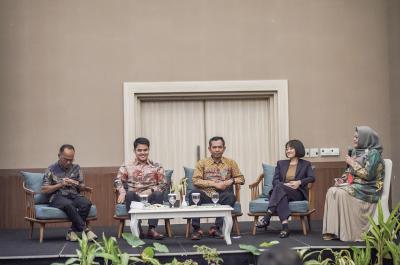
One of the key challenges addressed through the 1st Maluku Energy Forum 2024 is the development of electricity and renewable energy investments. This challenge arises due to the lack of coordination among various stakeholders with authority and interests in the energy sector, including Provincial and Local Government agencies, private companies, and state-owned enterprises (BUMN).
To promote renewable energy (RE) development, Indonesia continues to require global investments, particularly from developed countries with advanced renewable energy systems. Foreign investments can drive economic activities by creating jobs and generating added economic value.
During the Side Event panel discussion session titled “Presentation of Renewable Energy Business Investment Plans in Maluku Province” on Thursday, 21 November 2024, the focus was specifically on renewable energy investment plans in Maluku. The session aimed to provide insights into the development and planned renewable energy investments in the province, identify opportunities and challenges related to ongoing or proposed projects and business plans, and emphasise the importance of building networks among the government, state-owned enterprises (BUMN/BUMD), and other stakeholders involved in renewable energy initiatives in Maluku.
This panel discussion features experts in their respective fields, including M. Riduan Hamissy, Coordinator of Investment Implementation Control and Information at the Maluku Provincial Investment and Integrated Licensing Service Office; Rojak Luhut, Project Developer at UPC Renewables Indonesia; Kurniadi Ramadhan, Business Development Coordinator at PT. HDF Energy Indonesia; and Faustin Saputra, Director of Manufacturing at PT. Deltamas Solusindo.
Currently, Maluku Province's energy mix remains low, as reflected in the energy mix targets outlined in the Regional Regulation (Perda) of Maluku Province Number 1 of 2022 concerning the General Plan for Regional Energy of Maluku 2022–2050. Thus, strategic efforts are still needed to encourage its development.
This panel discussion addressed these challenges comprehensively. Moving forward, synergy and commitment from all stakeholders—including local governments, state-owned and regional-owned enterprises, professionals, and business actors—are essential to collectively support Indonesia’s accelerated energy transition towards achieving Net Zero Emissions by 2060.
